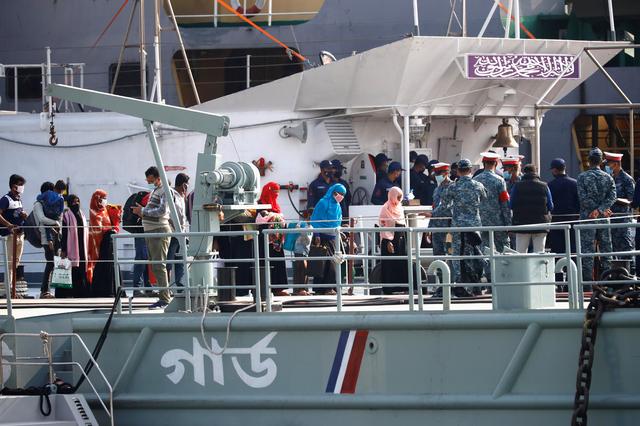If Rohingya must be moved, Bangladesh has to allay fears
https://arab.news/89eve

The government of Bangladesh has begun moving thousands of Rohingya refugees from Cox’s Bazar, near the border with Myanmar, to Bhasan Char, a silt island in the Bay of Bengal. This is deeply regrettable.
We must understand why the government of Bangladesh feels it needs to do this. Cox’s Bazar is struggling under the weight of more than 1 million refugees and the humanitarian infrastructure in the area is hopelessly overwhelmed, even after three years of development. Between those concerns, and extra concerns about the geological stability of the site (the government refers to a high risk of landslides), it does seem unlikely that the area around Cox’s Bazar can sustain 1 million-plus people on a long-term basis.
And now the government of Bangladesh is expecting that it will need to manage the Rohingya refugee situation on a long-term basis. For three years, it chose to hope against hope that some sort of settlement could be struck with Myanmar, whereby the Rohingya could return to their native lands relatively soon. But, in recent months, Dhaka finally seems to have acknowledged the reality that Myanmar has not been negotiating in good faith. This change in stance was signaled last month, when Bangladesh donated to the legal effort against Myanmar on behalf of the Rohingya, which is being led by The Gambia at the International Court of Justice.
Moreover, Bangladesh has been looking to ease the pressure on Cox’s Bazar for some time and has invested more than $300 million into building facilities on Bhasan Char that are of a far higher quality than anything that can be found in Cox’s Bazar. The notion that the Rohingya will need to be settled in other areas is not problematic in and of itself.
However, what has been problematic from the very beginning has been the choice of Bhasan Char. The island is very isolated, some 20 miles from the mainland. It is unsuitable for agriculture overall, and can scarcely sustain more than 300,000 in the most extreme scenario. This raises two huge concerns: Firstly, it means that the Rohingya refugee community will be split up, which may deal a deadly blow to their identity as a people; and, secondly, those who end up living on the island will likely remain permanently economically dependent on Bangladesh and/or international aid for food and other essentials.
Those who end up living on Bhasan Char will likely remain permanently economically dependent on aid for food and other essentials.
Dr. Azeem Ibrahim
But Bangladesh is one of the most densely populated countries in the world. The government struggled to find more suitable locations and, unfortunately but somewhat understandably, did not want to take the political risks involved in settling large numbers of foreign aid-dependent Rohingya refugees among native Bangladeshis, who themselves are among the poorest and most vulnerable people in the world. The choice to keep the refugee population separate is deeply sad, but it may well be the correct one if, in the long term, it protects the Rohingya from a backlash from local people who think they are crowded out by an external group with more international support than they themselves receive.
There are no good choices here. But, now that the relocations have begun, Bangladesh needs to do certain things to allay the fears of the Rohingya and of the international community about the possible consequences. It must ensure that international nongovernmental organizations and UN humanitarian agencies have full access to the island, and that those living there are provided with full education, health, and other facilities. Moreover, constant and reliable contact and movement of people between the island and Cox’s Bazar must be provided, so that the two communities are not permanently separated.
- Dr. Azeem Ibrahim is a director at the Center for Global Policy in Washington, DC. Twitter: @AzeemIbrahim









































